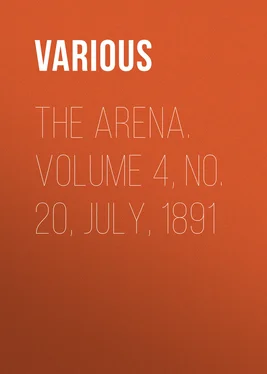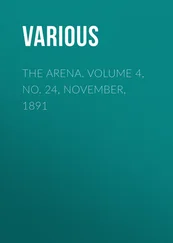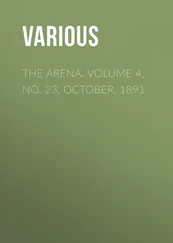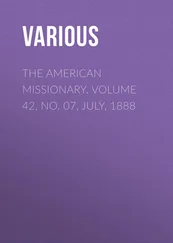Various - The Arena. Volume 4, No. 20, July, 1891
Здесь есть возможность читать онлайн «Various - The Arena. Volume 4, No. 20, July, 1891» — ознакомительный отрывок электронной книги совершенно бесплатно, а после прочтения отрывка купить полную версию. В некоторых случаях можно слушать аудио, скачать через торрент в формате fb2 и присутствует краткое содержание. Жанр: foreign_antique, periodic, foreign_edu, на английском языке. Описание произведения, (предисловие) а так же отзывы посетителей доступны на портале библиотеки ЛибКат.
- Название:The Arena. Volume 4, No. 20, July, 1891
- Автор:
- Жанр:
- Год:неизвестен
- ISBN:нет данных
- Рейтинг книги:5 / 5. Голосов: 1
-
Избранное:Добавить в избранное
- Отзывы:
-
Ваша оценка:
- 100
- 1
- 2
- 3
- 4
- 5
The Arena. Volume 4, No. 20, July, 1891: краткое содержание, описание и аннотация
Предлагаем к чтению аннотацию, описание, краткое содержание или предисловие (зависит от того, что написал сам автор книги «The Arena. Volume 4, No. 20, July, 1891»). Если вы не нашли необходимую информацию о книге — напишите в комментариях, мы постараемся отыскать её.
The Arena. Volume 4, No. 20, July, 1891 — читать онлайн ознакомительный отрывок
Ниже представлен текст книги, разбитый по страницам. Система сохранения места последней прочитанной страницы, позволяет с удобством читать онлайн бесплатно книгу «The Arena. Volume 4, No. 20, July, 1891», без необходимости каждый раз заново искать на чём Вы остановились. Поставьте закладку, и сможете в любой момент перейти на страницу, на которой закончили чтение.
Интервал:
Закладка:
It is easy to sneer away statements like these. It is easy to laugh them off as “mere pessimism,” and to talk of persons with “green spectacles” and “disordered livers.” We have learned to know the glad ring of the optimist’s patriotic voice. If we all believed this voice, we should all believe that America is the ideal polity of the world. And one never so keenly realizes that this is not true as when he watches the creeds and character of society in New York. Of Londoners we are apt to assert that they grovel obsequiously before their prince, with his attendant throng of dukes, earls, and minor gentlemen. This may be fact, but it is very far from being the whole fact. In London there is a large class of ladies and gentlemen who form a localized and centralized body, and whose assemblages are haunts of intelligence, refinement, and good taste. In a certain sense these are “mixed,” but all noteworthy gatherings must be that, and the “smart” and “swagger” sets of every great European city are nowadays but a small, even a contemptible factor in its festivities.
Not long ago the present writer inquired of a well-known Englishman whether people of literary and artistic note were not always bidden to large and important London receptions. “In nearly all cases, yes,” he replied. “It has been the aim of my sister to invite, on such occasions, authors, artists, and actors of talent and distinction. They come, and are welcomed when they come.” He did not mention the name of his sister, knowing, doubtless, that I knew it. She was an English duchess, magnificently housed in London, a beauty, and a star of fashion.
But our New York brummagem “duchesses” of yesterday are less liberal in their condescensions. An attractive New York woman once said to me: “I told a man the other day that I was tired of meeting him incessantly at dinner, and that we met each other so often in this way as to make conversation a bore.” Could any remark have more pungently expressed the unhappy narrowness of New York reunions? How many times has the dainty Mr. Amsterdam or Mrs. Manhattan ever met men and women of literary or artistic gifts at a fashionable dinner in Fifth or Madison Avenue? How many times has he or she met any such person at a “patriarchs’ ball” or an “assembly?” Has he or she ever met an actor of note anywhere , except in two or three exceptional instances? True, men and women of intellectual fame shrink from contact with our noble Four Hundred. But that they should so shrink is in itself a scorching comment. They encounter patronage at such places, and getting patronage from one’s inferiors can never be a pleasant mode of passing one’s time. That delicate homage which is the due of mental merit they scarcely ever receive. Now and then you hear of a portrait-painter, who has made himself the rage of the town, being asked to dine and to sup. But he is seldom really held to be des nôtres , as the haughty elect ones would phrase it, and his popularity, based upon insolent patronage, often quickly crumbles. The solid devotion is all saved for the solid millionnaires. Frederick the Great, if I recall rightly, said that an army was like a snake, and moved on its stomach. Of New York society this might also be asserted, though with a meaning much more luxurious. To be a great leader is to be a great feeder. You must dispense terrapin, and canvas-back ducks, and rare brands of champagne, in lordly dining-halls, or your place is certain to be secondary. You may, if a man, have the manners of a Chesterfield and the wit of a Balzac; you may, if a woman, be beautiful as Mary Stuart and brilliant as DeStaël, and yet, powerless to “entertain,” you can fill no lofty pedestal. “Position” in New York means a corpulent purse whose strings work as flexibly as the dorsal muscles of a professional toady. And this kind of toady has an exquisite flair for your greatness and dignity the moment he becomes quite sure of your pecuniary willingness to back both. New York is at present the paradise of parvenus, and these occasionally commit grotesque mistakes in the distribution of civilities. Because you chose to “stay in” for a season or two, they will take for granted, if suddenly brought in contact with you, that you have never “been out” and could not go if you tried. Of course, to feel hurt by such cheap hauteur proves that you are in a manner worthy of it; but even though you are not in the least hurt, you cannot refrain from a thrill of annoyance that a country which has boasted in so loud-mouthed a way to Europe of having begun its national life by a wholesome scorn of all class distinction, should contain citizens cursed by a spirit of such tawdry pride. At least the aristocracies of other lands, vicious and reprehensible as they have always been, are yet an evil with a certain malign consistency for their support. Like those monarchies of which they have formed a piteous adjunct, they have always been the outgrowths of a perfectly natural ignorance. Though distinct clogs to civilization, their existence remains pathetically legitimate. Nuisances, they are still nuisances with a hereditary hold on history. Their chief modern claim for continuance is the fact that they were once authorized by that very “divine right” which is now the scorn and jest of philosophy, and that the communities which they still infest are yet unprepared for the shock of their extirpation. It is clear that they will one day be sloughed off like a mass of dead animal tissue, even if they are not amputated like a living limb that has grown hopelessly diseased. They are as surely doomed by the slow threat of evolution as is the failure to establish trial by jury in Russia. They are tolerated by progress for the simple reason that progress is not yet ready to destroy them. Hence are all imitations of their permitted and perpetuated folly in wofully bad taste. They are more; they are an insult, when practised in such a land as ours, to republican energies, motives, and ideals. Heaven knows, we are a country with sorry enough substantiality behind her vaunts. We call ourselves freemen, and our mines and factories are swarming with haggard slaves. We declare that to be President of the United States is the most honorable office a man can hold, and our elected candidates (except when they have the splendid self-abnegating courage of a Cleveland!) wade to Washington through a perfect bog of venal promises. We prate of our democratic institutions, and forget that free trade is one of the first proofs of a free people, and that protected industries are the feudalism of manufacture. We sneer at the corruption of a Jeffreys or a Marlborough in the past, and concede that bribery riots in our capital, and that the infernal political grist-mill in New York has to-day almost as much nefarious grinding to get through with annually as it had when Tweed and Sweeny stood the boss millers that fed its voracious maw. And after all, the abominations of New York’s politics are only a few degrees more repellent than the cruelties and pusillanimities of her self-styled patrician horde. The highest duty of rich people is to be charitable; in New York the rich people make for themselves two highest duties, to be fashionable and to be richer—if they can. Charity of a certain sort does exist among them, and it would be unfair to say that it is all of the pompous public sort. Much of it, indeed, is private, and when incomes, as in a few individual cases, reach enormous figures, the unpretentious donations are of no slight weight. But charity is a virtue that counts for nothing unless meekness, philanthropy, altruism, is each its acolyte. How can we expect that beings who busy themselves with affairs of such poignant importance as whether they shall give Jones a full nod or Brown a quarter of a nod when they next meet him; as whether the Moneypennys are really quite lancés enough for them to encounter the great Gilt-edges or no, at a prospective dinner-party; as whether the latest Parisian tidings about bonnets are really authentic or the contrary; as whether His Royal Highness has or has not actually appeared at one of his imperial mamma’s drawing-rooms in a Newmarket cutaway,—how, it is asked, can we expect that beings of this bent may properly heed those ghastly and incessant wants which are forever making of humanity the forlorn tragi-comedy it is? The yawp of socialism is excusably despised by plutocracy. Socialism is not merely a cry of pain; if it were only that its plaints might have proved more effectual. It is a cry of avarice, of jealousy, and very often of extreme laziness as well. Every socialistic theory that we have yet heard of is self-damning. Each real thinker, whether he be Crœsus or pauper, comprehends that to empower the executive with greater responsibility than it already possesses would mean to tempt national ruin, and that until mankind has become a race of angels the hideous problem of human suffering can never be solved by vesting private property-rights in the hands of public functionaries. But the note of anguish in that voice of desperation and revolt need not, for all this, be confused with its madder strains. The claim of poverty upon riches is to-day a tremendously ethical one. Help—and help wise, earnest, persistent—is the inflexible moral tax levied by life itself on all who have an overplus of wealth wherewith to relieve deserving misery. The occasional careless signing of a cheque, or even a visit now and then among the filthy slums of Bayard and Hester Streets, cannot cancel these mighty obligations. And there are better ways of schooling the soul to recognize the magnitude and insistence of such obligations than by organizing ultra-select dancing-classes at Sherry’s; giving “pink luncheons” to a bevy of simpering female snobs; uncorking eight-dollar bottles of Clos de Vougeot for a fastidious dinner company of men-about-town; squandering three thousand dollars on a Delmonico ball, or purchasing at vast prices the gowns and jewels of a deposed foreign empress. Yes, there are better ways. And for people who are solely pleasure-seekers to call themselves Christian is, from their own points of view, blasphemy unspeakable; since whatever we agnostics may say and believe about the alleged “divinity” of Christ, they hold that the Galilean was the son of God, and that in such miraculous character he spoke when saying: “Leave all and follow me.”
Читать дальшеИнтервал:
Закладка:
Похожие книги на «The Arena. Volume 4, No. 20, July, 1891»
Представляем Вашему вниманию похожие книги на «The Arena. Volume 4, No. 20, July, 1891» списком для выбора. Мы отобрали схожую по названию и смыслу литературу в надежде предоставить читателям больше вариантов отыскать новые, интересные, ещё непрочитанные произведения.
Обсуждение, отзывы о книге «The Arena. Volume 4, No. 20, July, 1891» и просто собственные мнения читателей. Оставьте ваши комментарии, напишите, что Вы думаете о произведении, его смысле или главных героях. Укажите что конкретно понравилось, а что нет, и почему Вы так считаете.












